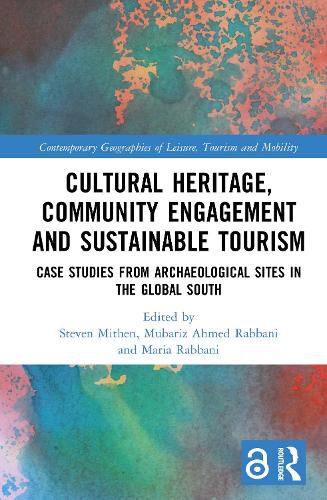Readings Newsletter
Become a Readings Member to make your shopping experience even easier.
Sign in or sign up for free!
You’re not far away from qualifying for FREE standard shipping within Australia
You’ve qualified for FREE standard shipping within Australia
The cart is loading…






This timely and innovative book critically explores how cultural heritage in the Global South can be used to mobilise community engagement and promote sustainable tourism at archaeological sites.
Whilst the volume covers theoretical issues, it primarily offers insight into how both small and large projects within low- and middle-income countries start, plan and develop. It describes what factors lead some projects to succeed, some to fail and most to have elements of both. Core to this investigation, each specifically commissioned chapter considers the challenges of developing collaboration and joint ownership between multiple stakeholders, ranging from local communities to national governments. In addition, the book considers how the challenges of the COVID-19 pandemic were managed, with lessons for future events of such magnitude. In summary, this significant volume recognises the value of developing collaborative partnerships between academics, NGOs and local communities, to achieve community engagement within archaeological research and support sustainable development by developing appropriate forms of tourism at archaeological sites. It provides essential reading for those interested in tourism, heritage studies, archaeology, geography, tourism studies and cultural studies.
The Open Access version of this book, available at http://www.taylorfrancis.com, has been made available under a Creative Commons [Attribution-Non Commercial-No Derivatives (CC BY-NC-ND)] 4.0 license.
$9.00 standard shipping within Australia
FREE standard shipping within Australia for orders over $100.00
Express & International shipping calculated at checkout
This timely and innovative book critically explores how cultural heritage in the Global South can be used to mobilise community engagement and promote sustainable tourism at archaeological sites.
Whilst the volume covers theoretical issues, it primarily offers insight into how both small and large projects within low- and middle-income countries start, plan and develop. It describes what factors lead some projects to succeed, some to fail and most to have elements of both. Core to this investigation, each specifically commissioned chapter considers the challenges of developing collaboration and joint ownership between multiple stakeholders, ranging from local communities to national governments. In addition, the book considers how the challenges of the COVID-19 pandemic were managed, with lessons for future events of such magnitude. In summary, this significant volume recognises the value of developing collaborative partnerships between academics, NGOs and local communities, to achieve community engagement within archaeological research and support sustainable development by developing appropriate forms of tourism at archaeological sites. It provides essential reading for those interested in tourism, heritage studies, archaeology, geography, tourism studies and cultural studies.
The Open Access version of this book, available at http://www.taylorfrancis.com, has been made available under a Creative Commons [Attribution-Non Commercial-No Derivatives (CC BY-NC-ND)] 4.0 license.